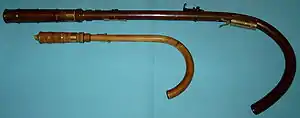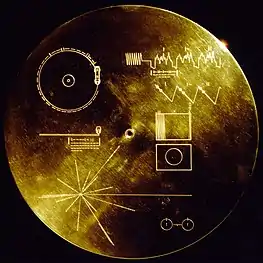David Munrow
David John Munrow (12 August 1942 – 15 May 1976) was a British musician and early music historian.
David Munrow | |
|---|---|
 Munrow playing a six-holed pipe in 1976 | |
| Background information | |
| Born | 12 August 1942 |
| Origin | Birmingham, England, United Kingdom |
| Died | 15 May 1976 (aged 33) Chesham Bois, England |
| Genres | Early music |
| Occupation(s) | Musician, broadcaster |
| Instruments | Recorder, shawm, crumhorn, dulcian |
| Years active | 10 |
| Labels | EMI, Argos, Archiv |
| Associated acts | Early Music Consort of London |
Life and career
Munrow was born in Birmingham where both his parents taught at the University of Birmingham. His mother, Hilda Ivy (née Norman) Munrow (1905-1985), was a dance teacher and his father, Albert Davis "Dave" Munrow (1908-1975), was a lecturer and physical education instructor who wrote a book on the subject.
Munrow attended King Edward's School until 1960. He excelled academically and was noted for his treble voice. He was lent a bassoon and returned in about a fortnight, able to play it remarkably well.

In 1960, Munrow took a gap year and went to Peru to teach English at Markham College in Lima under the British Council student teacher scheme.[1] He reached Lima by train from São Paulo and later spent some time touring Brazil, Bolivia, Peru and Chile, immersing himself in the traditional music of Latin America and collecting folk instruments. He returned home to Britain with a number of Bolivian flutes and other obscure instruments.[2]
While reading English for his master's degree[3] at Pembroke College, Cambridge, he became involved in musical performance, playing South American instruments in a students' autumn-term concert organised by Christopher Hogwood. A professor of music, Thurston Dart, was intrigued by Munrow's performance and encouraged him to explore links between Latin American folk instruments and early European instruments. While visiting Dart's study, Munrow noticed a crumhorn hanging on the wall; Dart suggested he borrow it and this eventually inspired Munrow to commence an independent study of early musical instruments.[2]
Starting from his ability as a pianist, singer and bassoonist, Munrow taught himself to play many older instruments. He joined the Royal Shakespeare Company as a bassoonist but soon played instruments of Shakespeare's time. Although he displayed talent on a wide variety of instruments, he had a particular lasting influence as a recorder player. His English style of discreet and controlled expression contrasts with the greater tonal flexibility of the Continental style espoused by the Dutch recorder player Frans Brüggen and others.
By 1967 he was appointed a lecturer in early music at the University of Leicester, having married Gillian Veronica Reid the previous year.[4] With Christopher Hogwood he formed the Early Music Consort, whose core members were experts on their particular instruments. Sometimes other professional musicians were employed when necessary, such as Nigel North and Robert Spencer, both highly regarded lutenists. From 1968, he toured the world, unearthing obscure instruments in every country he visited. He commissioned reconstructions of instruments related to the cornett and rackett from, amongst others, Otto Steinkopf. Two television programmes made him a household name: The Six Wives of Henry VIII (1970) and Elizabeth R (1971). He also scored the feature film adaptation of the former, Henry VIII and His Six Wives, in 1972.
The early music revival was born following Munrow's success with his soundtrack for The Six Wives of Henry VIII,[5] which contained authentic music played on original instruments,[6] and generated worldwide enthusiasm for music and instruments from the renaissance period.[7] Subsequently, demand for such historical instruments increased dramatically, resulting in Munrow's encouragement for the formation of a business specialising in this specific area, now known as The Early Music Shop, based in Bradford, West Yorkshire.[8] Munrow was a loyal and enthusiastic customer of the Early Music Shop, having helped the founder, Richard Wood, create the business' name, and travelling immediately to the music store to be re-equipped with a variety of historical instruments after losing his entire collection in a theft.[6]
Munrow's two contributions to film music were for British directors:
- Ken Russell's The Devils (1971). Munrow's contribution included numbers from Terpsichore, Michael Praetorius's collection of French dance music. It complemented an original score by Peter Maxwell Davies.[9]
- Zardoz (1974), written and directed by John Boorman. This included arrangements of Beethoven's Symphony No. 7 for early music instruments.
During his relatively short life, Munrow released over 50 records, some of which are now available on CD. In addition to his recordings with the Early Music Consort, he recorded with Michael Morrow's Musica Reservata, Alfred Deller and the King's Singers. He recorded Bach and Monteverdi many times, but his widest influence was in the Medieval and Renaissance periods. His three-record set with the Early Music Consort, The Art of the Netherlands, issued in 1976 (EMI SLS5049), was particularly influential in popularising the genre.
On BBC Radio 3 he presented Pied Piper, a multi-ethnic and centuries-spanning spread of music from Monteverdi to the Electric Light Orchestra rock group. Munrow also had dealings notably with the Young Tradition and Shirley and Dolly Collins.
Apart from his regular radio slot and other programmes, he appeared on television, most notably on BBC 2 in a series entitled Ancestral Voices in a London studio, and on ITV's Early Musical Instruments, filmed on location at Ordsall Hall in Salford. He also wrote one book entitled Instruments of the Middle Ages, and the Renaissance, Originally, this accompanied a record set of the same name.
Personal life
Munrow's personal interests were travel, sailing, jazz and antiques. He was also a linguist. In addition, he wrote some articles on music, especially for his own recordings.
Death
In 1976, Munrow hanged himself while in a state of depression; the recent deaths of his father and father-in-law, to whom he dedicated his sole book, are thought to have contributed to his decision to take his own life.[10][11] He had, however, attempted suicide by drug overdose the previous year.[12]
His death was noted to be a tragic loss to the early music movement, as no-one sufficiently followed in his footsteps.[6]
Legacy
Munrow perhaps did more than anyone else in the second half of the 20th century to popularise early music in Britain, despite a career lasting barely 10 years. This was underscored when the Voyager space probe committee selected one of his recordings to be carried on it as part of the Voyager Golden Record.
Munrow left behind him not only his recordings but a large collection of musical instruments. The Munrow Archive at the Royal Academy of Music holds a collection of his letters, papers, TV scripts, scores, musical compositions and books.[13][14][15] The collection is accessible to the public. The online catalogue of the British Library Sound Archive reveals his many recording entries, and those of many other notable people.
Information about the life and work of David Munrow can be found in obituaries about him in 1976 (particularly the OUP journal Early Music), and in the following sources: a detailed piece in the Oxford Dictionary of National Biography by Christopher Hogwood; The New Grove Dictionary of Music and Musicians; The Art of David Munrow, a record set with a biography by Arthur Johnson, the producer of Pied Piper; and on the old vinyl sleeve of the Renaissance Suite.
Selected discography
- Recordings with Musica Reservata
- French Court Music of the Thirteenth Century (1967)
- Music from the 100 Years War (1968)
- Music from the Decameron (1969)
- 16th Century Italian Dance Music (1970)
- Music from the Court of Burgundy (1971)
- Recordings with The Early Music Consort, directed by David Munrow
- Ecco la primavera – Florentine Music of the 14th Cent (1969)
- Music of the Crusades (1971)
- The Triumphs of Maximilian I (1970)
- Music for Ferdinand and Isabella of Spain (1972)
- The Art of Courtly Love (1973)
- Praetorius – Dances and Motets (1973)
- Music of Guillaume Dufay: Missa "Se La Face Ay Pale" (1974)
- Instruments of the Middle Ages and Renaissance (1976)
- Monteverdi's Contemporaries (1976)
- Music of the Gothic Era (1976)
- Greensleeves to a Ground (1976)
- Festival of Early Music – Music from 14th Century Florence, Music of the Crusades & The Triumphs of Maximilian (1976)
- Henry Purcell: Birthday Odes for Queen Mary (1976)
- The Art of the Netherlands (1976)
- Two Renaissance Dance Bands / Monteverdi's Contemporaries (1996; recordings from 1971 and 1975)
- The Young Tradition and Early Music Consort
- Galleries (1968)
- The Round Table & David Munrow
- Spinning Wheel (1969)
- "Saturday Gigue/Scarborough Fair" (single) (1969)
- Shirley and Dolly Collins & the Early Music Consort of London
- Anthems in Eden (1969)
- Love, Death and the Lady (1970)
- Amaranth (1976; reissue of the Anthems in Eden suite with one side of new recordings, credited to Shirley Collins only)
- Ashley Hutchings
- Rattlebone and Ploughjack (1976)
- Royal Shakespeare Wind Band, directed by Guy Wolfenden
- Music From Shakespeare's Time (1969)
- David Munrow, Gillian Reid, Christopher Hogwood
- David Munrow, Oliver Brookes, Robert Spencer, Christopher Hogwood
- The Amorous Flute (1973)
- David Munrow solo or in various combinations
- Telemann: Suite for Recorder and Orchestra, Concerti for Recorder and Orchestra by Sammartini and Handel
- The Art of the Recorder (1975)
- The Art of David Munrow (1971–1976)
Music for radio, television and cinema
Radio
- Tolkien's The Hobbit (BBC Radio 4 adaptation) (1968)
Television
- The Six Wives of Henry VIII (BBC TV) (1970)
- Elizabeth R (BBC TV) (1971)
Film
- The Devils (directed by Ken Russell) (1971)
- Henry VIII and His Six Wives (directed by Waris Hussein) (1972)
- Zardoz (directed by John Boorman) (1974)
- La Course en tête (directed by Joël Santoni) (1974). A documentary on Belgian cyclist Eddy Merckx. Soundtrack released as Renaissance Suite (1974)
Awards and recognitions
Grammy Award for Best Chamber Music Performance:
- David Munrow (conductor) & the Early Music Consort of London for The Art of Courtly Love (1977)
See also
Similar early music performers with an interest in renaissance and medieval music.
References
- David Munrow: Pied Piper. "Biography". Accessed on 31 October 2011 at: http://www.davidmunrow.org/biography.htm Archived 26 January 2017 at the Wayback Machine.
- Breen, Edward (1 May 2015). "David Munrow (of the Early Music Consort) and Folk Music - Semibrevity". Semibrevity. Archived from the original on 20 March 2018. Retrieved 20 March 2018.
- Who Was Who vol. 7, 1971, A. & C. Black, p. 569.
- Who Was Who vol. 7, 1971, A. & C. Black, p. 569.
- "David Munrow (1942-1976) - A discography". www.medieval.org. Retrieved 13 October 2018.
- Smith, Adrian (2000). Music Making in the West Riding of Yorkshire. R.H. Wood Publishing. pp. 122–123. ISBN 9780953988501.
- "DAVID MUNROW--Henry VIII & his Six Wives - Classics Today". www.classicstoday.com. Retrieved 13 October 2018.
- Crel, James (Autumn 2011). "In The Meantime...". Early Music Today: 12–13.
- Protheroe, Guy. "The Devils: Extended Note". maxopus.com. Retrieved 21 March 2016.
- Young, Rob (2010). Electric Eden: Unearthing Britain's Visionary Music. Faber & Faber. p. 204. ISBN 9780571258420. Retrieved 17 July 2018.
- Hebblethwaite, Phil (28 November 2016). "The tragic story of the man who inspired millions to love music - BBC Music". BBC Music. Archived from the original on 17 July 2018. Retrieved 17 July 2018.
- Handy, Maxine (2010). Triple-Portrait of a Countertenor. Lulu.com. p. 70. ISBN 9781446653449. Retrieved 17 July 2018.
- Searle, Robert (31 December 2013). "Overview of the Munrow Archive". The Early Music Legend - David Munrow. Royal Academy of Music Library / Blogger. Retrieved 31 October 2017.
- "David Munrow Archive". Royal Academy of Music Museum. Royal Academy of Music. Retrieved 31 October 2017.
- "BBC Radio 4 Extra - The Archive Hour, Mr Munrow, his Study". BBC. Retrieved 24 June 2019.
